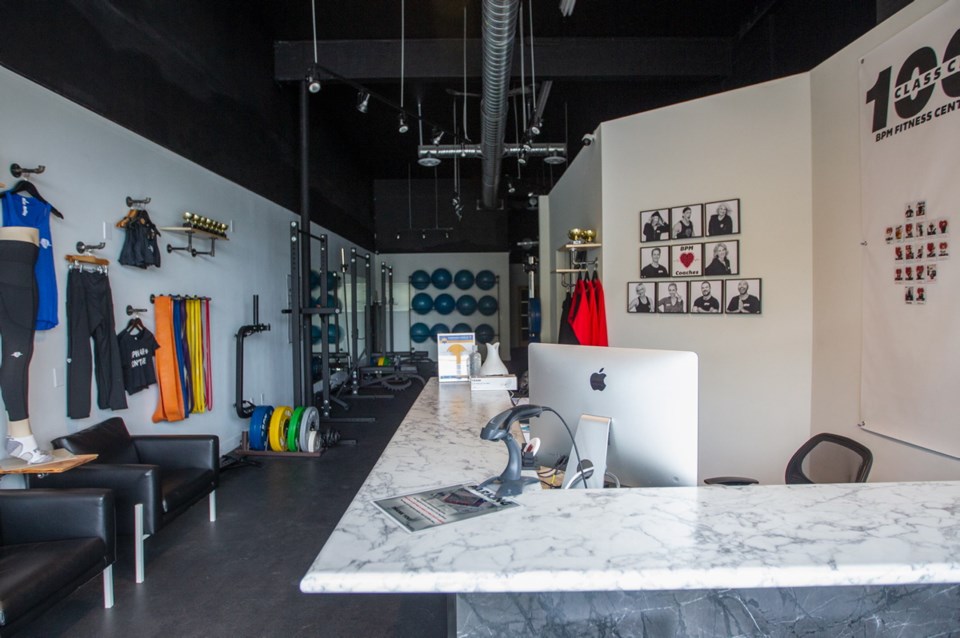Island gym owners are excited to reopen their doors after being given the green light to welcome back clients on Tuesday, but it won’t be a return to business as usual.
Keelan Clemens, co-owner of BPM Fitness Centre and BPM Indoor cycling in Victoria, said it felt like Christmas morning to receive an email from Island Health that said gyms would be allowed to reopen on May 19.
“We’ve been pushing hard to get back up and running. We’re super excited to get going,” he said.
He has been particularly concerned about his clients’ mental health during the pandemic without access to their regular exercise routines.
“Mental-health concerns skyrocketed when gyms closed,” he said, adding he raised the point with Island Health in an effort to persuade the health authority to give gyms the go-ahead to reopen. “It’s something that can’t really be ignored.”
Island Health announced Friday it will lift an order from the health authority’s chief medical health officer, Dr. Richard Stanwick, that required all gyms, fitness centres, yoga studios and personal training facilities to close at the start of April.
Business owners will have to create an operational plan that follows public-health guidelines and post the plan on their websites and in their facilities for customers, Island Health and WorkSafeB.C. to review.
Gyms will have to reduce the number of clients they serve to ensure physical distancing is possible and provide hand-sanitizing stations and disinfecting materials to wipe down equipment between each use. They will also be expected to ask clients if they have symptoms of COVID-19 when they arrive and deny entry to anyone with symptoms, and post signs informing customers to stay home if they’re sick.
Island Health’s guidelines also encourage facilities to limit locker-room use or eliminate it altogether and close water fountains.
Clemens said he and his business partner, Sally Larrington- Brown, have a plan for their fitness centre and will reopen the facility for personal training and a limited number of small-group classes on Tuesday.
They’ll start with just one or two classes per day and work up to a full schedule of six or more in a day if everything goes well, Clemens said. “We can’t just offer everything right out of the gate.”
They expect to open the spin studio the following week, with every other bike available for use.
Clemens said they conducted a survey of their members and about 75 per cent are itching to get back into the gyms, while a quarter of respondents were still apprehensive.
Many fitness facilities pivoted to offering online classes during the pandemic. Even as they return to offering in-person workouts, some gym operators plan to continue providing online classes for the time being.
Kristen Jensen, owner of Alive Mindbody in North Park, said in-person classes will be streamed online for those who choose to remain at home or aren’t able to snag a spot in the smaller classes they’ll be offering.
She said the studio, which offers classes in yoga, pilates, barre and pole fitness, will reopen for in-person classes on June 1, but they’ll only be operating at about 30 per cent capacity to ensure clients can keep two metres apart.
In a studio that would normally hold up to 35 people, Jensen expects only 10 to 15 people will be able to join a class in person.
The facility will also take care of more interactions online, such as payments and check-in.
The announcement Friday doesn’t ease restrictions for all activities. Island Health’s guidelines state that group classes should not be held if participants cannot maintain two metres’ distance at all times, and “at no time should participants have any physical contact.”
That won’t work for Jean-Marc de Groot, owner of Van Isle Brazilian Jiu Jitsu. The jiu jitsu academy that he co-owns with his brother, Matthew de Groot, focuses on the Brazilian martial art, which is based on grappling with a partner.
“There’s not a lot of options when you have to maintain a two-metre distance,” he said. “For us, it’s troublesome.”
De Groot said he knows that other martial-arts gyms are planning to open some programs, such as kickboxing, or invest in expensive grappling dummies that can cost more than $800 each. De Groot said those options don’t work for his gym, because it’s specialized to train for jiu jitsu, and he doesn’t think splurging on grappling dummies makes sense at a time that’s financially difficult for many small business owners.
Dummies can’t replace training with a partner, he said, because jiu jitsu is about reacting to their actions. Grappling dummies “just sit there. It doesn’t give you any reaction,” he said.
He’s hoping that by late summer, restrictions will ease further and allow the community to return to the jiu jitsu mat.
They’re looking at how they could reopen and reduce the risk of spreading the virus when it becomes possible. De Groot said they’re considering creating permanent grappling partners or small groups that only train together.
He said the toughest part of closing the gym has been losing the connection with the community.
“It’s our family. A lot of time has been spent with these people on the mats,” he said.
Island Health said in an emailed statement that any decision about when to allow activities that involve physical contact will be made at the provincial level.



